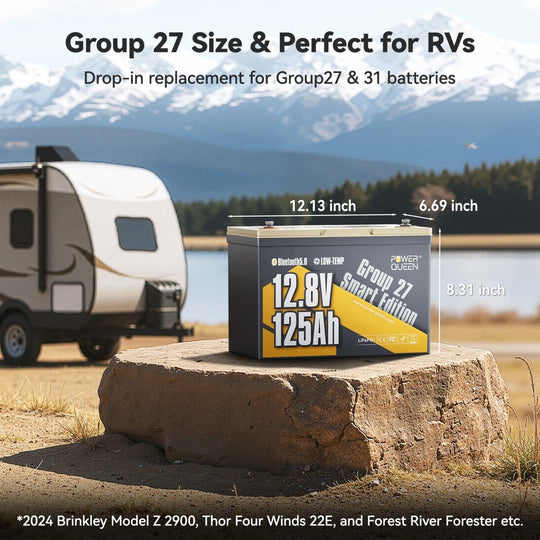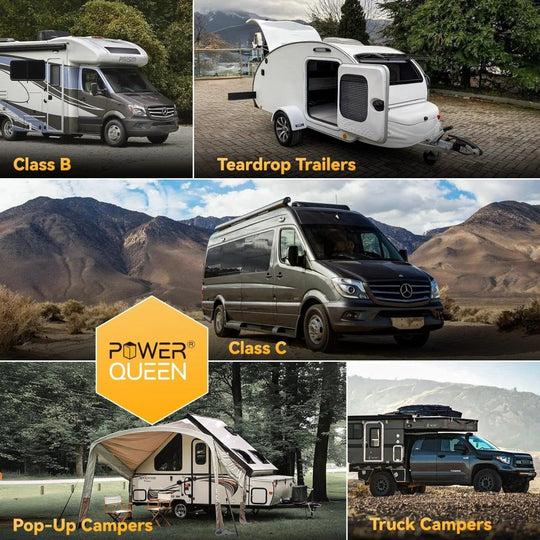


Group 24 and Group 27 batteries are commonly used in RVs, marine applications, backup power systems, and medical devices. These batteries are widely utilized in numerous applications, but what distinguishes them? Let's look at the fundamental distinctions between Group 24 and Group 27 batteries.
Table of Content
- Part 1. What is a Group 24 Battery?
- Part 2. What is a Group 27 Battery?
- Part 3. Key Differences: Group 24 vs Group 27
- Part 4. Which Battery Should You Choose?
- Part 5. Upgrade to a Lithium Group 24 Battery for Better Performance
- Part 6. FAQs about Group 24 VS Group 27 Battery
- Part 7. Conclusion
Part 1. What is a Group 24 Battery?
A Group 24 battery is standard-sized, measuring 10.5" L x 6.19" W x 8.88" H. It is widely utilized in automobiles, backup power systems, and medical devices. Group 24 batteries are often deep cycle batteries, meant to supply long-term power rather than just starting an engine.

Part 2. What is a Group 27 Battery?
Group 27 batteries are typical in size, but larger than Group 24 batteries. The dimensions are 12.5" L x 6.75" W x 9.37" H. These batteries are commonly used in RVs, boats, off-grid systems, and backup power systems. Group 27 batteries have greater amp hours, therefore they can store and provide more energy than Group 24 batteries.

Power Queen 12V 125Ah Group27 Smart Deep Cycle Lithium Battery
Part 3. Key Differences: Group 24 vs Group 27
3.1 Dimensions
- Group 24: 10.5" L x 6.19" W x 8.88" H.
- Group 27: 12.5" L x 6.75" W x 9.37" H.
The two batteries have same width and height. However, the Group 27 battery is longer and hence too large for some compartments meant for Group 24 cells. If you have a battery compartment for Group 27, it should accommodate a Group 24 battery, but not the other way around.
3.2 Capacity
Group 27 batteries have a higher capacity, which means they can deliver more power. The greater the group number, the more amp hours a battery can hold.
3.3 Chemistry
Both Group 24 and Group 27 batteries come in a variety of chemistries, including:
- Sealed Lead Acid (SLA)
- Absorbent Glass Mat (AGM)
- Gel-cell
- Flooded Lead Acid (FLA)
- Lithium
Lead-acid batteries cost less, but lithium batteries last longer and are more environmentally friendly.
3.4 Common Applications
3.4.1 Group 24 Often used in
- Backup power systems
- Large UPS systems
- Medical devices like wheelchairs
- Security and industrial applications
They can also be used as starter or cranking batteries for small motors.
3.4.2 Group 27 Used in
- Off-grid setups
- RVs
- Boats
- Automotive applications
- Backup power systems
These batteries are suited for applications that require higher power and longer-lasting performance.
Part 4. Which Battery Should You Choose?
Before buying a battery, consider its size, capacity, and intended usage. The size of the battery's group influences its physical dimensions and performance, as well as the location of terminals and the accessories required (like inverters and chargers).
If you're replacing a battery in an RV, a Group 24 deep cycle battery might be the best option. It is a common size for RVs.

Power Queen 12V 100Ah Group 24 Deep Cycle Lithium Battery
Part 5. Upgrade to a Lithium Group 24 Battery for Better Performance
If you want to strengthen your power system, upgrading to a Lithium Group 24 battery is a wise decision. Lithium batteries have significant advantages over typical lead-acid batteries. Whether you're using them in an RV, boat, or backup system, upgrading to lithium can improve your experience. Here is why:
5.1 Longer Lifespan
Lead-acid batteries have a much shorter lifespan than lithium batteries. A typical Group 24 lead-acid battery lasts two to three years. In comparison, with good care, a Lithium Group 24 can live for ten years or more. This translates to fewer replacements and lower long-term expenditures.
5.2 More Power, Less Weight
Lithium batteries have better energy density than lead-acid. They provide more energy while being smaller and lighter. In an RV or boat, this implies longer journeys with less weight to transport. They also charge faster, allowing you to hit the road or water sooner.
5.3 Faster Charging
Lithium batteries recharge quickly. A Group 24 lead-acid battery might take hours to recharge, whereas a Lithium Group 24 charges in half the time. This ensures that your devices do not experience long wait times.
Related reading: How to Charge LiFePO4 Batteries.
5.4 Better Performance in Cold
Lithium batteries operate better in severe temperatures. Lead-acid batteries lose power in cold weather. However, lithium batteries retain their strength even in frigid temperatures. This makes them ideal for winter camping, boating, and off-grid life.
Suggest reading: Do Lithium Batteries Freeze? How To Use Lithium Battery In Winter?
5.5 Built-in Safety Features
The majority of lithium batteries incorporate a Battery Management System (BMS). The BMS protects against overcharging, overdischarging, high temperatures, and short circuits. This keeps the battery secure and increases its lifespan. Furthermore, you won't have to worry about maintenance issues like acid spills or corrosion, which are frequent with lead acid batteries.

5.6 Environmentally Friendly
Lithium batteries are environmentally friendly. They do not contain toxic chemicals and are easier to recycle. By upgrading to a Lithium Group 24, you can minimize your carbon footprint and benefit the environment.
5.7 No Maintenance Needed
Lithium batteries require minimal or no maintenance. Unlike lead-acid batteries, which require frequent maintenance (such as water levels and terminal cleaning), lithium batteries simply work. Once installed, they require practically no maintenance, saving you time and effort.
Part 6. FAQs about Group 24 VS Group 27 Battery
6.1 Can Group 24 and Group 27 Batteries Be Interchanged?
While the sizes of Group 24 and Group 27 batteries differ, they may be interchangeable depending on the available space in your vehicle or system. Group 27 batteries are larger, but they provide more power. If size is not a concern, you can utilize a Group 27 battery instead of a Group 24. Check your system's needs to verify compatibility.
You may learn more about different group size batteries by clicking on Group 24 VS Group 31 Deep Cycle Battery.
6.2 Which is Better? Group 24 or Group 27?
It depends on your requirements. Group 27 batteries are ideal for high-power applications including big commercial equipment and larger RVs. They deliver more energy, last longer, and are better suited to high-drain systems. However, Group 24 batteries remain a viable option for smaller, less power-hungry gadgets.
Group 24 batteries are frequently seen in automobiles and other compact vehicles. While they may not provide as much power as Group 27 batteries, they are adequate for low-current applications. Some Group 24 variants provide 500-840 Cold Cranking Amps (CCA), making them ideal for starting small engines such as motorbikes or snowmobiles.
6.3 Can I Mix Group 24 and Group 27?
No, combining 24 and 27 battery packs is not recommended owing to potential installation and performance concerns. While voltage compatibility exists, size incompatibilities may impair overall efficiency and safety. Following proper installation procedures and checking manufacturer specifications will result in an ideal battery setup while minimizing danger.
To mix or connect the battery in series or in parallel, Power Queen suggest that:
- The batteries must have the same capacity (Ah) and the same Battery Management System (BMS) rating (A) for lithium batteries.
- They should be from the same brand, because other brands of batteries have different BMS settings or battery cells.
- It is advisable to purchase them within a similar time span, ideally within a month.
Part 7. Conclusion
When deciding between Group 24 and Group 27 batteries, take into account the size, power needs, and application of your system. Group 27 batteries provide higher power and are suitable for larger systems. However, Group 24 batteries are more compact and suitable for smaller devices and backup power solutions.
If you're eager to get the benefits of lithium power, consider upgrading to a Lithium Group 24 battery. Whether you're replacing an old lead-acid battery or installing a new system, this update will elevate your power experience to the next level. Contact the Power Queen team for more information on how our Lithium Group 24 batteries can benefit your setup.
Blog posts
-

, by Kookie Zhang Will RV Fridge Run Off Battery While Driving?
-

, by Kookie Zhang Group 24 VS Group 27 Battery: What’s the Difference?
-

, by Kookie Zhang [Full Guide] What Is A Group GC2 Battery
Featured products
Share information and details about these products




















































































































![[5% OFF Only $402] Power Queen 12V 200Ah PLUS Deep Cycle Lithium Battery Power Queen](http://ipowerqueen.com/cdn/shop/files/5_-OFF-Only-_402_-Power-Queen-12V-200Ah-PLUS-Deep-Cycle-Lithium-Battery-Power-Queen-40707029.jpg?v=1729852516&width=645)

![[5% OFF Only $417] Power Queen 24V 100Ah Deep Cycle Lithium Battery Power Queen](http://ipowerqueen.com/cdn/shop/files/5_-OFF-Only-_417_-Power-Queen-24V-100Ah-Deep-Cycle-Lithium-Battery-Power-Queen-40707166.jpg?v=1729852572&width=645)



![[5% OFF Only $503] Power Queen 12V 280Ah Low-Temp Deep Cycle Lithium Battery Power Queen](http://ipowerqueen.com/cdn/shop/files/5_-OFF-Only-_503_-Power-Queen-12V-280Ah-Low-Temp-Deep-Cycle-Lithium-Battery-Power-Queen-40707227.jpg?v=1729852615&width=645)

![[5% OFF Only $541] Power Queen 12V 300Ah Deep Cycle Lithium Battery Power Queen](http://ipowerqueen.com/cdn/shop/files/Power-Queen-12V-300Ah-Deep-Cycle-Lithium-Battery.jpg?v=1736387315&width=645)

![[6% OFF Only $1033] Power Queen 12V 410Ah Deep Cycle Lithium Battery Power Queen](http://ipowerqueen.com/cdn/shop/files/6_-OFF-Only-_1033_-Power-Queen-12V-410Ah-Deep-Cycle-Lithium-Battery-Power-Queen-40707481.jpg?v=1729852675&width=645)





![Copy of [Only $239.99] Power Queen 12.8V 100Ah Low-Temp LiFePO4 Battery Perfect for Trolling Motor, Built-in 100A BMS, Match BCI Group 31 Battery Box Power Queen](http://ipowerqueen.com/cdn/shop/files/Copy-of-_Only-_239.99_-Power-Queen-12.8V-100Ah-Low-Temp-LiFePO4-Battery-Perfect-for-Trolling-Motor_-Built-in-100A-BMS_-Match-BCI-Group-31-Battery-Box-Power-Queen-35552893.jpg?v=1706845679&width=645)
![[Like New] Power Queen 12V 100Ah Low-Temp Deep Cycle Lithium Battery](http://ipowerqueen.com/cdn/shop/files/1_2fe8ffcf-bb0e-4682-90ad-c954bd4a0a6f.jpg?v=1734945468&width=645)
![[Only $799] Power Queen 36V 100Ah Smart Deep Cycle Lithium Battery Power Queen](http://ipowerqueen.com/cdn/shop/files/Only-_799_-Power-Queen-36V-100Ah-Smart-Deep-Cycle-Lithium-Battery-Power-Queen-40707943.jpg?v=1729852834&width=645)






